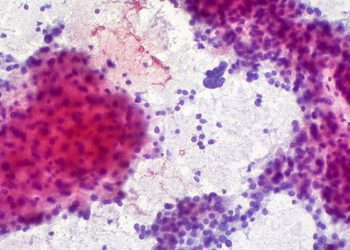Inappropriate clinical management decisions are possible secondary to use of Bazett formula for QTc in context of chemotherapy cancer treatment
1. The Bazett formula showed greater CTCAE grading than either Fridericia or Framingham formulae in 40.9% of total ECGs.
2. In patients receiving QT-prolonging chemotherapy, 17.9% of clinical management changes were inappropriate based on the formula used.
Evidence Rating Level: 2 (Good)
Study Rundown: A common side effect of chemotherapy treatment for cancer includes prolonged QT interval, which can potentially lead to fatal arrhythmias. There are multiple formulae available to determine corrected QT (QTc) interval and no standardized approach to which formula is appropriate to inform clinical decisions. This study explored how clinical management decisions and adverse event (AE) grading of QTc prolongation are associated to QT interval formula. The Bazett, Fridericia, and Framingham formulae were compared. There was concordance among all 3 formulae when evaluating for Common Terminology Criteria for Adverse Events (CTCAE) grading of QTc prolongation in 56.6% of all ECGs, however, the use of the Bazett formula showed greater CTCAE grading than either Fridericia or Framingham formulae in 40.9% of total ECGs. There were 421 patients receiving chemotherapy treatment that prolongs the QT interval (2,340 ECGs collected). Generally, these patients had greater QTc values than the entire cohort. The Bazett formula identified grade 3 CTCAE toxicity in a greater percent of these ECGs than either the Fridericia or Framingham formulae. Out of 142 patients (496 ECGs) on QTc-prolonging treatment, there were 28 encounters resulting in a change in clinical management secondary to QT prolongation. Of these, 17.9% were inappropriate when considering the formula chosen. Of the 496 ECGs collected on these patients, only 30 had medical record documentation of the QTc formula selected to guide clinical management. Additional limitations to this study include inability to infer causality due to the retrospective nature of the study. Overall, the results from this study provide evidence that the use of the Bazett formula results in likely inappropriate treatment modifications for patients receiving QTc-prolonging chemotherapy as it calculates higher QTc values and almost triplicate indication of grade 3 CTCAE toxicity when compared with two other formulae.
Click to read the study in JAMA Oncology
Relevant Reading: Trials and tribulations of corrected QT interval monitoring in oncology: rationale for a practice-changing standardized approach
In-Depth [prospective cohort]: This prospective cohort study was completed out of the University of North Carolina Cancer Hospital in the United States. The study was conducted on the electrocardiograms (ECGs) of 6,881 adult patients for a total of 19,955 ECGs collected over a 10-year period. Regarding the CTCAE criteria, there was 58.3% concordance between Bazett and Fridericia, 56.8% between Bazett and Framingham, and 94.2% between Framingham and Fridericia. 2.7% of ECGs were found to have grade 3 toxicity using Fridericia formula, 1.8% using Framingham, and 9.0% using Bazett formula. 1.8% of all ECGs were identified as Grade 3 by all three formulae. There was a median difference between Bazett and Fridericia on absolute QTc values of 26.4 milliseconds (ms) (95% confidence interval (CI), -9.3 to 62.0 ms). The median difference between Bazett and Framingham was 27.8 ms (95% CI, -13.1 to 71.7 ms) and 1.5 ms between Fridericia and Framingham (95% CI, -7.8 to 13.8 ms). Patients receiving chemotherapy known to prolong the QT had greater QTc values than the entire cohort, and the mean differences were 3.43ms by Framingham formula, 3.24ms by Fridericia, and 1.55ms by Bazett formula. Using all 3 formulae, 2.6% of these ECGs met grade 3 CTCAE criteria. When considering the formulae separately, grade 3 toxicity was identified in 2.7% (Framingham), 4.5% (Fridericia), and 12.5% (Bazett) of these ECGs. There were 293 ECGs from this cohort that met grade 3 CTCAE toxicity criteria using Bazett formula, but 65.2% of those were identified as grade 2 or less by Framingham or Fridericia formulae. Of 142 patients (496 ECGs) on QTc-prolonging treatment, there were 28 visits resulting in clinical changes secondary to QT prolongation. There were 5 clinical decisions that were determined to be inappropriate based on the QTc formula selection. Only 6% of encounters had the chosen QTc formula documented in the record.
Image: PD
©2022 2 Minute Medicine, Inc. All rights reserved. No works may be reproduced without expressed written consent from 2 Minute Medicine, Inc. Inquire about licensing here. No article should be construed as medical advice and is not intended as such by the authors or by 2 Minute Medicine, Inc.


![2 Minute Medicine: Pharma Roundup: Price Hikes, Breakthrough Approvals, Legal Showdowns, Biotech Expansion, and Europe’s Pricing Debate [May 12nd, 2025]](https://www.2minutemedicine.com/wp-content/uploads/2025/05/ChatGPT-Image-May-12-2025-at-10_22_23-AM-350x250.png)


![Reduced neuronal BRCA1 associated with decreased DNA repair in Alzheimer’s disease [PreClinical]](https://www.2minutemedicine.com/wp-content/uploads/2015/12/DNA_Furchen_edited-75x75.png)

